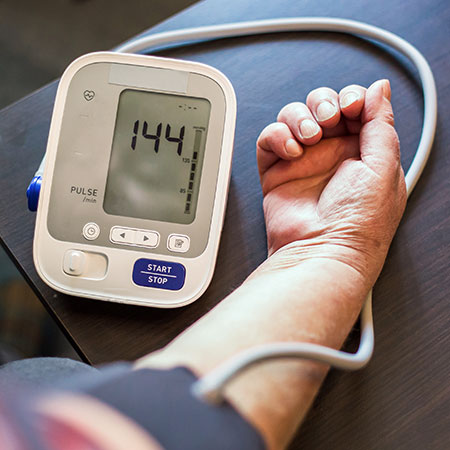High blood pressure, also known as hypertension, has reached epidemic proportions in the United States, with nearly half of adults (47 percent) suffering from the condition. And among those who do have it, only 1 in 4 have their hypertension under control, according to the U.S. Centers for Disease Control and Prevention.
Not only is hypertension a chronic condition in and of itself, but it also leads to a host of other health problems, including heart disease, stroke—and perhaps even dementia. That is the finding of an April study published in JAMA Network Open, which showed that people who suffer from hypertension when they’re younger show greater signs of brain deterioration in their old age.
The Study
Researchers from the University of California, Davis, examined the health records of 427 participants in the Kaiser Healthy Aging and Diverse Life Experiences (KHANDLE) study and the Study of Healthy Aging in African Americans (STAR), which provided them with data from 1964 to 1985 for a diverse group of older Asian, Black, Latino and white adults.
The researchers specifically focused on blood pressure readings taken when the participants were between the ages of 30 and 40 to determine whether they had been hypertensive, were transitioning to hypertensive, or had normal blood pressure in young adulthood. Then, MRI scans of the participants conducted between 2017 and 2022 allowed researchers to look for late-life neuroimaging biomarkers of neurodegeneration and white matter integrity.
When compared to participants who’d had normal blood pressure in their 30s, the brain scans of those who had been transitioning to had high blood pressure showed lower cerebral gray matter volume, frontal cortex volume, and fractional anisotropy (a measure of brain connectivity).
The research also showed that the negative brain changes in some regions—such as decreased grey matter volume and frontal cortex volume—were stronger in men. Researchers speculated that these differences may be related to the protective benefits of estrogen before menopause but cautioned that due to the study’s small sample size, more research is needed to determine if there are significant differences between the sexes in this regard.
Conclusions
The study joins a growing body of evidence that cardiovascular risk factors in young adulthood are detrimental to late-life brain health, which may help develop preventive strategies for warding off Alzheimer’s disease and dementia.
“Treatment for dementia is extremely limited, so identifying modifiable risk and protective factors over the life course is key to reducing disease burden,” said the study’s first author Kristen M. George, PhD, assistant professor in the Department of Public Health Sciences at UC Davis. “High blood pressure is an incredibly common and treatable risk factor associated with dementia.”
“This study truly demonstrates the importance of early-life risk factors, and that to age well, you need to take care of yourself throughout life—heart health is brain health,” said Rachel Whitmer, PhD, senior author of the study. “We are excited to be able to continue following these participants and to uncover more about what one can do in early life to set yourself up for healthy brain aging in late life.”







